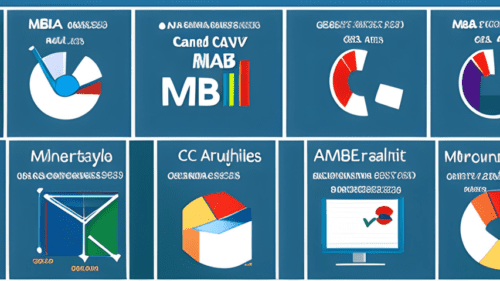MBA in Data Analytics: Navigating the World of Big Data and Business Insights
In today’s fast-paced digital landscape, data has emerged as the new currency of business success. As organizations gather massive amounts of information, the need to make sense of this data has given rise to the field of data analytics. Within this domain, pursuing a Master of Business Administration (MBA) with a specialization in Data Analytics has become a popular choice for those looking to blend their business acumen with advanced analytical skills. This article will delve into the world of MBA in Data Analytics, exploring its benefits, curriculum, career prospects, and more.
Introduction
In an era characterized by information overload, organizations are harnessing data to unlock valuable insights that drive innovation and growth. As data continues to shape industries, professionals with the ability to extract meaningful information from vast datasets are in high demand. This is where an MBA in Data Analytics comes into play.
Understanding Data Analytics and its Significance
Data analytics involves the systematic analysis of data to uncover patterns, trends, and correlations. It provides businesses with actionable insights that inform decision-making processes. From identifying customer preferences to optimizing supply chains, data analytics is a powerful tool that enhances strategic planning and operational efficiency.
The Intersection of Business and Data Science
The convergence of business and data science is revolutionizing industries. Today’s businesses rely on data-driven strategies to gain a competitive edge. An MBA in Data Analytics equips professionals with the skills to bridge this gap, enabling them to interpret data through a business lens.
Unpacking MBA in Data Analytics
What is an MBA in Data Analytics?
An MBA in Data Analytics is a specialized program that combines traditional business education with advanced training in data analysis. It equips students with a deep understanding of data manipulation, statistical modeling, and data visualization techniques.
Why Choose an MBA in Data Analytics?
Pursuing an MBA in Data Analytics offers several advantages. It provides a comprehensive education that not only focuses on technical skills but also hones leadership and communication abilities. Graduates are well-prepared to tackle complex business challenges in a data-driven world.
Building a Strong Foundation
Core Courses in Data Analytics
The curriculum of an MBA in Data Analytics encompasses a range of core courses. Students delve into subjects such as data mining, predictive modeling, and data ethics. These courses lay the groundwork for advanced specialization.
Business Fundamentals
In addition to data-centric courses, students also gain a solid understanding of business principles. Topics like marketing, finance, and strategy ensure graduates possess a well-rounded skill set.
Navigating the Complexities of Big Data
Advanced Analytical Techniques
As data sets become larger and more complex, advanced analytical techniques are essential. Students learn to leverage tools like Python, R, and SQL to extract insights from massive datasets.
Data Mining and Visualization
Data mining techniques allow professionals to sift through data to discover hidden patterns. Visualization tools then transform these insights into easily understandable visuals, aiding in effective communication.
Bridging the Gap: Business Strategy and Data Insights
Strategic Decision-Making
An integral part of an MBA in Data Analytics is learning how to make strategic decisions based on data-driven insights. Graduates are equipped to identify opportunities, mitigate risks, and develop growth strategies.
Market Analysis and Consumer Behavior
Understanding market trends and consumer behavior is crucial in today’s dynamic business landscape. Data analytics provides the tools to analyze consumer preferences and adapt business strategies accordingly.
The Power of Predictive Analytics
Forecasting and Planning
Predictive analytics utilizes historical data to forecast future trends. Businesses can anticipate demand, optimize inventory, and make informed decisions that drive success.
Risk Assessment and Management
Data analytics plays a pivotal role in risk assessment and management. By analyzing historical data, businesses can identify potential risks and implement strategies to mitigate them.
From Learning to Application: Real-World Projects
Internships and Experiential Learning
MBA in Data Analytics programs often include opportunities for internships and experiential learning. These real-world projects provide hands-on experience, allowing students to apply their skills in practical settings.
Capstone Projects
Capstone projects culminate the learning experience, requiring students to solve complex business challenges using data analytics. These projects showcase students’ proficiency and creativity in applying data-driven solutions.
Your Path to Success: Career Opportunities
Data Scientist or Analyst
Graduates can pursue roles as data scientists or analysts, where they analyze data to extract insights and inform business decisions.
Business Intelligence Manager
Business intelligence managers oversee data collection and analysis processes, guiding organizations in making informed strategic choices.
Market Research Analyst
Professionals in this role assess market trends and consumer preferences, helping businesses develop products and services that meet customer demands.
Admissions and Prerequisites
Educational Background
Applicants typically hold a bachelor’s degree in a relevant field such as business, economics, or mathematics.
GMAT/GRE Scores
Many programs require GMAT or GRE scores as part of the application process. These scores help admissions committees assess applicants’ aptitude for the program.
A Glimpse into the Future: Trends in Data Analytics
Artificial Intelligence and Machine Learning
The integration of AI and machine learning with data analytics is on the rise. These technologies enhance predictive capabilities and automate decision-making processes.
Ethical Considerations
As data becomes more integral to business operations, ethical considerations surrounding data privacy and usage are gaining prominence. Professionals in this field must navigate complex ethical dilemmas.
Conclusion
An MBA in Data Analytics equips graduates with the skills to transform raw data into strategic insights. By merging business acumen with analytical prowess, professionals are poised to drive innovation, enhance competitiveness, and make informed decisions in today’s data-driven world.
Frequently Asked Questions
- Is a background in data science necessary to pursue an MBA in Data Analytics? While a background in data science can be beneficial, it is not always a prerequisite. MBA programs in Data Analytics typically provide foundational courses to bring students up to speed.
- What industries can I work in with an MBA in Data Analytics? Graduates can find opportunities in various industries, including finance, healthcare, e-commerce, and consulting.
- How does an MBA in Data Analytics differ from a traditional MBA? An MBA in Data Analytics places a stronger emphasis on data-centric skills and their application in business contexts.
- Are there opportunities for networking in these programs? Yes, many MBA programs in Data Analytics offer networking opportunities through industry partnerships, guest lectures, and alumni events.
- What role does storytelling play in data analytics? Storytelling is vital in data analytics, as it helps convey insights effectively to non-technical stakeholders, aiding in decision-making.
Read More


